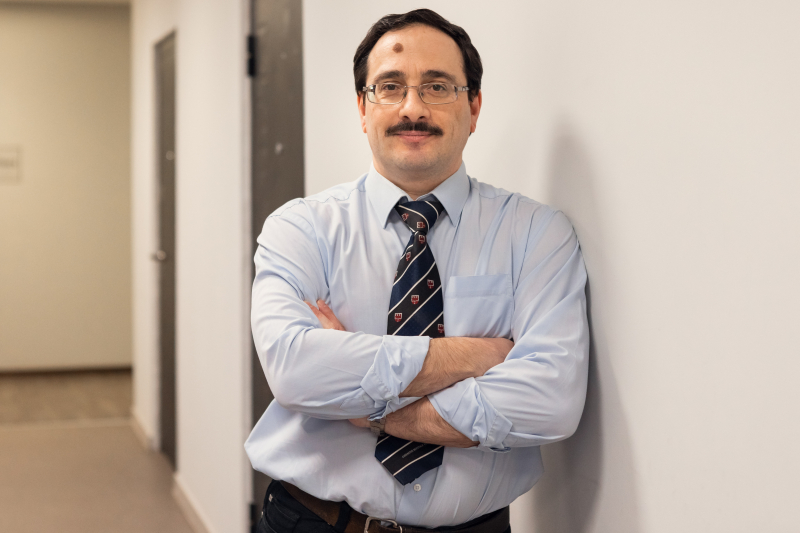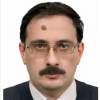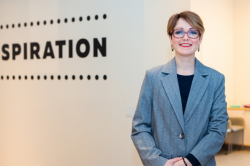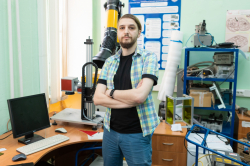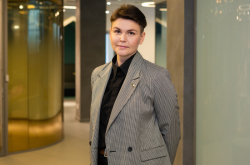How did you enter the field of science?
In 1995, I graduated from Peter the Great St. Petersburg Polytechnic University’s Faculty of Technical Cybernetics. I think this was one of the best technical higher education programs at that moment. Among our lecturers were unique specialists who worked on the reconstruction of facilities after the Second World War, so they were familiar with all electric motors and generators and provided us with truly fundamental engineering knowledge.
However, one university wasn’t enough for me, so I also graduated from the Federal Institute of Industrial Property. There I learned how to read technical documents. Then, for about 25 years I’d been working at companies dealing with pretty much the same topics I now work with at ITMO: automation, information security, audit, standardization, design of information systems for state-owned and private companies, and so on.
In 2012, I defended my PhD thesis – by chance. I was 40 years old and went on a business trip by train. I met a former colleague of mine, whom I used to work with on an interesting project in the field of information security for government agencies. His name is Alexander Moldovyan, a prominent scientist and the founder of the Russian cryptography school. We both were on our way to a conference and he asked me if I will present my report there and if I have a degree and scientific publications. I said that I have a report and I have publications but I don’t have a degree. He suggested that I defend my thesis at the St. Petersburg Institute for Informatics and Automation of the Russian Academy of Sciences where he worked. As a result, six months later I acquired a PhD degree without actually studying for it.
Then, in 2019 I defended a doctoral dissertation without studying for it, too. It was about models and methods of information security audit for integrated control systems at complex industrial objects. I’m interested in forming an evidential base in this field. As I often tell my students, you can eternally argue whose poetry is better – Omar Khayyam’s or Shakespeare’s, but when it comes to engineering systems, the argument can be solved by measurements and calculations. That’s what I teach my students.
How did you start working at ITMO University?
Thanks to a funny story. I was working in the industry at the time and I was approached by a colleague who was a graduate student at the Faculty of Secure Information Technologies. He asked me to come to his thesis defense to support him. He had a very interesting but complex thesis topic, the council was great, and during the discussion I took the liberty of answering some of the questions that were addressed to my colleague. The discussion between me and the council continued, and after about half an hour, the chairman stopped it by saying: “Young man, are you this active only here or are you ready to teach everyone?” I said that I was ready, and two months later, in August 2016, I joined the university as an assistant professor.
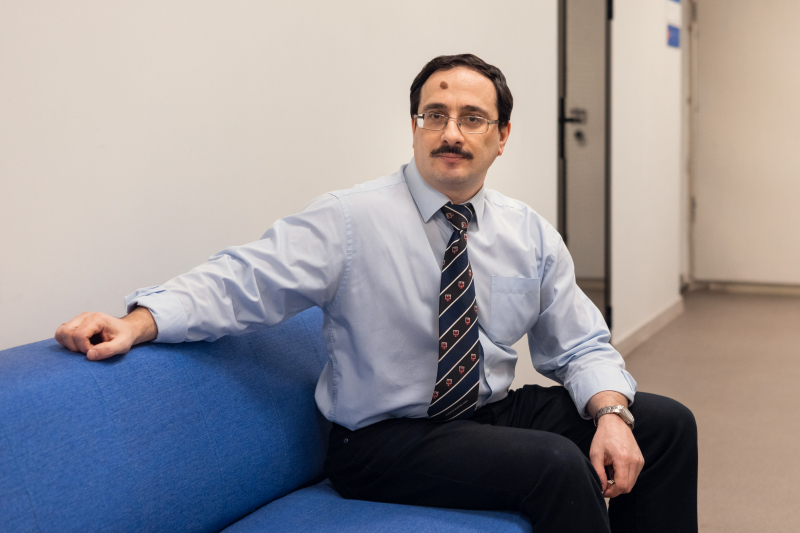
Ilya Livshits. Credit: Dmitry Grigoryev, ITMO.NEWS.
What’s the most important thing in teaching?
In 1992, we did an internship at an industrial facility and a wise and experienced turner asked us if it was possible to make a rectangular hole using a lathe. Some students said yes, others – no, to which he responded with “Firstly, there’s no reason to do that. Secondly, it’s impossible.” This phrase stayed with me: I’ve been keeping it in mind for 30 years now and I teach my students to thoroughly think first (as the web is full of “genius” videos) and only then – do something.
In over six years of teaching, all the students to whom I was a research advisor defended their works with excellent marks and I’m ready to help everyone. The most important and precious thing to me is when in a couple of years after graduation, they ask me to join their projects in various topics: critical information infrastructure for a sea port, information security at a major construction company, or an audit for a banking system. We stay in touch after graduation and become job partners.
Two years ago, we came up with a new course in economics of information security. Viktor Shved gives the lectures and I’m in charge of practical training. This is an honor for me, as he’s a professional with amazing competencies, just like many other professors at ITMO, and it’s a pleasure to work with him. Last year, a girl who studied this course calculated indifference curves using Edgeworth-Pareto principles, thus repeating the work of John Hicks, for which he received a Nobel Prize. So I can safely say our specialists are valued for the real knowledge they teach, and it’s great.
What other things do you pay attention to while teaching?
For me, it makes no difference whether someone is a student or a teacher, I treat everyone with great respect, and it’s mutual. Therefore, for example, it’s unacceptable for me to be late for a lecture. The door to my classroom is always open. If people come to study, I already respect them for it, because studying is hard work. Like my students, I do home tasks: they ask a variety of questions, but I can’t always answer them right away (for example, there are more than 24 thousand ISO standards), so I do my research at home and start the next class with answers.
I also advise my students to never suffer alone when they’re working on a complex paper or questions related to stuff like eIDAS international payment systems, security of an automated system for control of the technological process (ICS), or information chains in logistics. Together we can pick a system of standards or a practice most suitable for the occurring challenges. When this happens, students see that I’ve proven my level of expertise, and ask me to help in bigger projects.
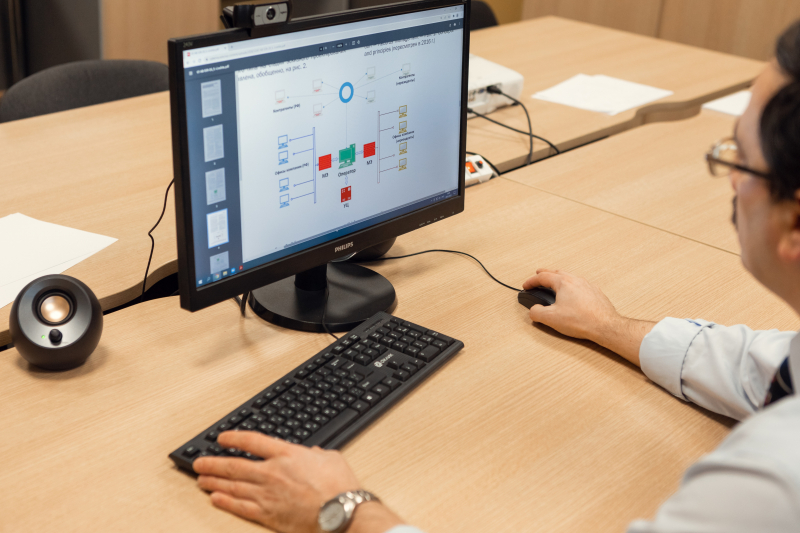
Ilya Livshits. Credit: Dmitry Grigoryev, ITMO.NEWS.
Two years ago, I had a student who worked at the same company as me. He wrote a draft for his thesis, calculated the payoff period of one of the SIEM systems and the result was almost 1,500 years. The paper had to be submitted soon, so we came up with a way to fasten the payoff process and do it fairly, as an engineer is someone who lives honestly. There’s an old parable about an engineer who creates in five dimensions: length, width, height, time, and conscience. I recommend my students to follow this principle, so that everything they do could be checked.
How do you keep your expertise up-to-date in the rapidly changing field?
Together with Aalto University, we implement a joint Master’s program Information Security, for Russian and international students. Plus, last year we had problems related to distance learning, so I had to come up with a way to engage all the listeners.
First things first, we had to come up with a remote learning system. We presented it at the ITMO.EduLeaders contest; this was a joint project of the faculty. Every fundamental theoretical section is followed by practical tasks and lecturers control the progress, so if students don’t understand something, I can detect this, ask them about it, and we discuss the tough parts. Our aim is to turn our students into qualified specialists, not make them drop out. As I explain in my classes, the audit should provide conformity assessment, not aim to destroy something. Same thing applies to the university.
There are different kinds of students: some just want to obtain a degree, and others want to work in academia. I treat everyone with understanding. For example, last year, together with a PhD student Yegor Sokolov and colleagues from the industry, we patented a cross-border secure electronic document management system, and it’s very important for me that Rospatent’s lawyer didn’t reduce our patent claims at all. But still, the main thing is to overcome apathy and explain that the students at our university, especially in the 21st century, are ambitious specialists who will reach the global level soon. Therefore, I teach them the latest global and national standards on audit, risk management, compliance and other topics. Usually, they change every five to seven years. In other words, even now students are gaining knowledge that many auditors working in the industry don’t have.
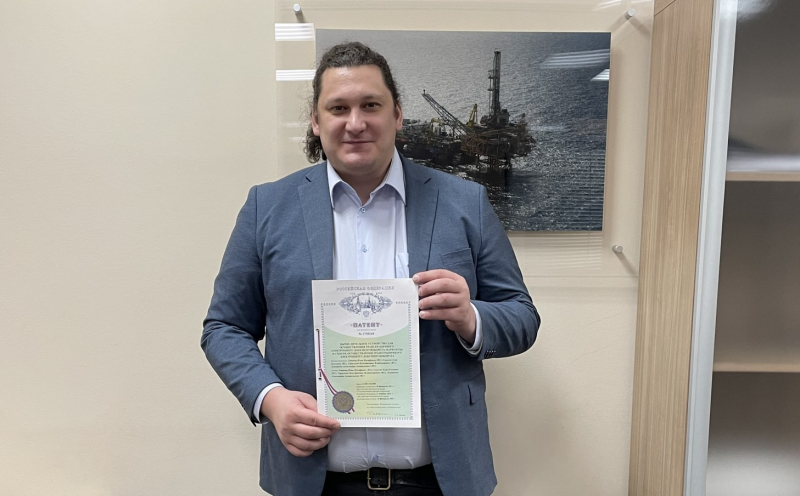
Yegor Sokolov with a patent for an electronic documentation system. Photo courtesy of Ilya Livshits.
Last year, you made it to the finals of ITMO.EduLeaders with a project on methods for complex diagnostics in remote learning and won the ITMO.EduStars track. What do you think about these achievements?
This was a surprise for me. A month after I found out about the victory, I asked Kristina Ivanova (the head of the Staff Support Office) to share my points, and it turned out that I’m eighth among over a thousand ITMO lecturers.
At ITMO.EduLeaders, it was interesting for me to share what I do in the form of a compact presentation and talk about it – first at the faculty, and then on the main campus during the finals. For me, each publication or speech is not self-promotion, I don’t aim to promote my Telegram channel. These things help improve my teaching, understand whether I am moving in the right direction and if I explain everything clearly to my students, and decide what material is most relevant. In my opinion, the 2-3% of students from the course (and the course this year, for example, includes 70 people) who don’t make it to the exam is a lot and I try to consult each of them. Therefore, for me, ITMO.EduStars and ITMO.EduLeaders are, first of all, objective assessment systems that help all participants of the educational process at ITMO become better.
